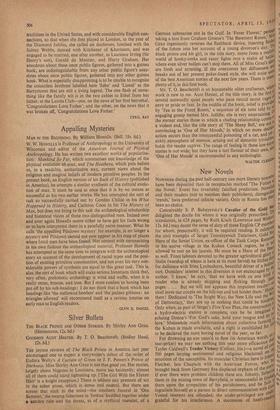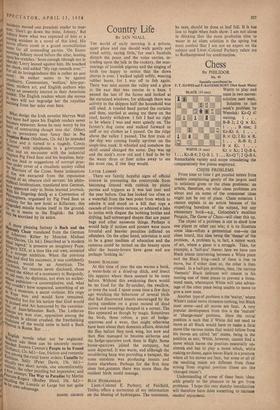New Novels
NOWHERE during the past half-century can more literary nonsen t,s! have been deposited than in receptacles marked The Future,.,0 the Novel.' Event has invariably falsified prediction. Novel"'i and their readers (not to mention their publishers), disregarclinr; 'trends,' have preferred infinite variety. Only in Russia has then been no choice.
Conceivably S. P. Babayevsky's Cavalier of the Gold delighted the docile for whom it was originally prescribed. translation, in 628 pages, by Ruth Kisch (Lawrence and Wish2ri; 12s. 6d.) may daunt the sense of duty of those English CP member; for whom, presumably, it will be required reading. It celebrate( the civil triumphs of Sergei Timofeyevich Tutarinov, Gold Std Hero of the Soviet Union, ex-officer of the Tank Corps. Return0t to his native village in the Kuban Cossack region, lie is P allowed to rest on his laurels. He must be a Hero of the l'e3c/ as well. From labours devoted to the greater agricultural glory 0.,4 Stalin (worship of whom is here at its most fervid) he filches 11' for dalliance with Irina Lyubashova, beautiful driver of a bull0'4 cart. Outsiders' interest in this diversion is not encouraged bY,10tif author. 'I know,' he says, 'that we have with us one kindest reader who is already skipping and flicking through t't pages. . . . But we will not appease this impatient reader"de shall leave our couple on the hill-top and not hinder them.' 0111,011 them! Dedicated to 'The Bright Way, the New Life and the of Democracy,' they are up to nothing that could be hindered, Only when, as part of Sergei's Five-Year Plan, the construction , 0 a hydro-electric station is complete, can he be imagined tilt echoing Donne's 'For God's sake, hold your tongue and let . love.' Meanwhile much information about collective farrnineO, the Kuban is made available, and a right is established for tti
to be declared the most boring novel of the year, so far. 59
For drowning an eye unus'd to flow (in American words, 11, W tear-jerker) we may see nothing this year more efficacious they m. Taylor Caldwell's Tender Victory (Collins,,16s.)—a novel a 0,,„ 500 pages levying sentimental and religious blackmail on 10) 6 emotions of the susceptible. Its muscular Christian hero is J011110 Fletcher, late Chaplain with the American Forces, who III 1.4,e1 brought back from Germany five displaced orphans of the st°'.00 If ever there were problem children these are. Johnny, fathefloipe them in the mining town of Barryfield, is unsuccessful in foist tc re( them upon the sympathies of his parishioners, and ftit'sotl to ingratiate himself as a parson in direct communication with °der Vested interests are offended; the tinder-privileged are ith,.01 grateful for his interference. A succession of heart-reoul incidents moved one prescient reader to mur- mur, MU. r, Don't go down the mine, Johnny,' But je.nnnY knew what was expected of him at a nulling accident in a novel of this kind. His
r
heroic efforts result in a grand reconciliation for all contending parties. 'On Easter 10 scene Morning Johnny stood before the altar, leaning 11130n his crutches.' Soon enough (though not in church) 'Lorry leaned against him. He touched her Cheek, and added "My cup runneth over." ' Per all its rather lovingkindness this is ra an anti novel: its author seems to be against 13,,YehiatrY, Communism, 'welfare,' hire-pur- ,,enase, modern art, and English authors who Market. The English readers whom she moves
an unseemly interest in their American
1° tears will begrudge her the royalties not begru accruing from her sales over here.
scene 45 What design the Irish novelist Mervyn Wall tilaY have had upon his English readers never hecortu
Or h4bit of apparent. Some he may worry by his T __If contracting though into tho'. Others
$ 40 pernickety may fancy that in No 9, IMPhies Raise (Methuen, 12s. 6d.) he intended : ,a farce and it turned to a tragedy. Comic
ij busin office ess' with telephones in a government and an encounter with the industrial II:esatgnsaote Pig Feed Sam and his hopeless, help-
n lead to suggestions of corrupt prac- ,,ls ander cover of a ritualistic society called
w trriors of the Cross. Some intimations n(4 fun llie ...i,
is I are extracted from the reputation
-.road of an obscure civil servant: his philo- ksolThie uave al lucubrations, translated into German, with r peared only in Swiss learnedjournals. as lingering deat at a Convention of PhilosoPhers, organised by Pig Feed Sam as tnis,,,,:itY for his new hotel at Killarney, this P9blie sf . or -sw_id 9 missile buries itself in the ground. K ,, 0 it seems to the English : the Irish .4ay , r u0 scorched by its satire.
i`kvIellttore pleasing fantasy is Bach and the 01 of joillY Choir translated from the German 0 q ¢,i (liart.ilEtnnes Rtlber by Maurice Michael naptit hvies 12s. 6d.). Described as 'a modern cl regoltegend,' it presents an imaginary Pope, d by 4 'Y XIX, at a time like our own, actuated strange ambition. When the previous iii l'oDe had died his successor, it was confidently Carding would would be an American. The lit t ardinals, for reasons never disclosed, chose el adl3tead the Abbot of a monastery in Burgundy, 0 4 aniicinaldi Man, no diplomat, not even an ecclesi- lit Politician—a contemplative, and, what
theY c(
e artist, Alldnt have suspected, something reign ill 41 Pea musician, a secret violinist. His reign Pe Was, and would have remained, uneven
tful but for his notion that God would
ti he Dra tian otsed and Art honoured by the canonisa- binhopf Jean-Stbastien Bach. The Lutheran 01 are won over, opposition among the , tn4nrndicini,als is almost crushed, the freethinking ost, Festival of the world unite to hold a Bach ''' .1 in Rome. But 9 trig witholtish novels must not be, neglected. it ado these can be sincerely recom- e, 'nem, bt (c d: Joanna Cannan's People to be Found °Ilancz, 12s. 6d.)—fun, friction and romantic of 'ye a )(still:long the rural lower orders; Canaille by a acilialien Sully (Peter Davis, 13s, 6d.)-
tn Y two short novels, one uncomfortably
tealistie, the other puzzling but impressive; and 14 a first , 414easoittRernospet; The Way to Paradise by Merlin reeallirn s (Bodley Head, 10s. 6d.)— to its the Lunatic at Large but not quite
)wn advantage.











































 Previous page
Previous page